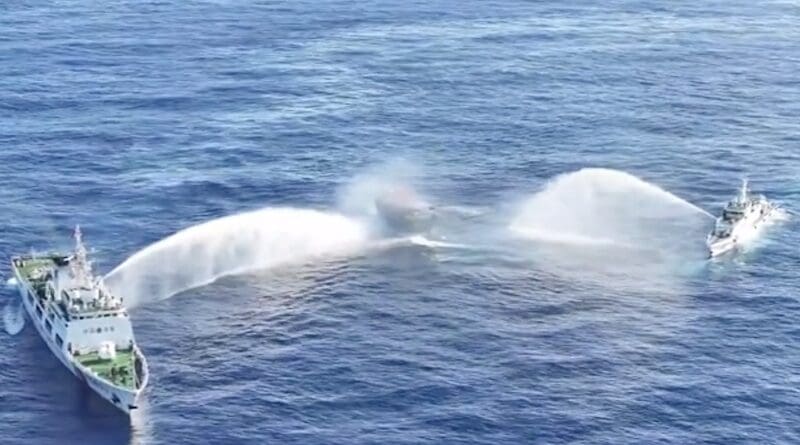BY KIM TONG-HYUNG AND ANIRUDDHA GHOSAL
June 19, 2024
HANOI, Vietnam (AP) — Russian President Vladimir Putin and North Korean leader Kim Jong Un signed an agreement Wednesday that pledges mutual aid if either country faces “aggression,” a strategic pact that comes as both face escalating standoffs with the West.
Details of the deal were not immediately clear, but it could mark the strongest connection between Moscow and Pyongyang since the end of the Cold War. Both leaders described it as a major upgrade of their relations, covering security, trade, investment, cultural and humanitarian ties.
The summit came as Putin visited North Korea for the first time in 24 years and the U.S. and its allies expressed growing concerns over a possible arms arrangement in which Pyongyang provides Moscow with badly needed munitions for its war in Ukraine, in exchange for economic assistance and technology transfers that could enhance the threat posed by Kim’s nuclear weapons and missile program.
From North Korea, Putin traveled to Vietnam, where he exited his plane onto a red carpet and briefly shook hands with dignitaries while soldiers in white dress uniforms stood at attention. In Hanoi, Putin is scheduled to meet with Vietnam’s most powerful politician, Communist Party General Secretary Nguyen Phu Trong, and new President To Lam, as the Russian leader seeks to strengthen ties with a longtime partner.
What’s known, and not known, about the partnership agreement signed by Russia and North Korea
During Putin’s visit to North Korea, Kim said the two countries had a “fiery friendship,” and that the deal was their “strongest ever treaty,” putting the relationship at the level of an alliance. He vowed full support for Russia’s war in Ukraine.
Putin called it a “breakthrough document” reflecting shared desires to move relations to a higher level.
North Korea and the former Soviet Union signed a treaty in 1961 that experts say necessitated Moscow’s military intervention if the North came under attack. The deal was discarded after the collapse of the USSR, replaced by one in 2000 that offered weaker security assurances. It wasn’t immediately clear if the new deal provides a similar level of protection as the 1961 treaty.
Kim met Putin at the airport, where the two shook hands, hugged twice and rode together in a limousine. The huge motorcade rolled through the capital’s brightly lit streets, where buildings were decorated with giant Russian flags and portraits of Putin.
After spending the night at a state guest house, Putin was welcomed Wednesday morning in a ceremony at the city’s main square, filled with what appeared to be tens of thousands of spectators, including children with balloons and people in coordinated T-shirts of the red, white and blue national colors of both countries. Crowds lining the streets chanted “Welcome Putin,” and waved flowers and flags.
Putin and Kim saluted an honor guard and walked across a red carpet. Kim introduced key members of his leadership, including Foreign Minister Choe Son Hui; top aide and ruling party secretary Jo Yong Won; and the leader’s powerful sister, Kim Yo Jong.
At their talks, Putin thanked Kim for North Korea’s support in Ukraine, part of what he said was a “fight against the imperialist hegemonistic policies of the U.S. and its satellites against the Russian Federation.”
Putin praised ties that he traced to the Soviet army fighting the Japanese military on the Korean Peninsula at the end of World War II, and Moscow’s support for Pyongyang during the Korean War.
What kind of support was pledged in the agreement was not spelled out. Explanations of the agreement by the leaders did not specify what the “mutual assistance” would be in the event of aggression against either country — troops, materiel or some other sort of aid.
Kim has used similar language before, consistently saying North Korea supports what he describes as a just action to protect Russia’s interests and blaming the crisis on the West’s “hegemonic policy.”
North Korea is under heavy U.N. Security Council sanctions over its weapons program, while Russia also faces sanctions by the U.S. and its Western partners over its invasion of Ukraine.
U.S. and South Korean officials accuse the North of providing Russia with artillery, missiles and other military equipment for use in Ukraine, possibly in return for key military technologies and aid. On Tuesday, a U.S. State Department spokesman said that in recent months, Washington has seen North Korea “unlawfully transfer dozens of ballistic missiles and over 11,000 containers of munitions to aid Russia’s war effort.”
Both Pyongyang and Moscow deny accusations of weapons transfers, which would violate multiple U.N. Security Council sanctions that Russia previously endorsed.
Along with China, Russia has provided political cover for Kim’s efforts to advance his nuclear arsenal, repeatedly blocking U.S.-led efforts to impose fresh U.N. sanctions on the North over its weapons tests.
In March, a Russian veto in the Security Council ended monitoring of U.N. sanctions against North Korea over its nuclear program, prompting Western accusations that Moscow is seeking to avoid scrutiny as it buys weapons from Pyongyang.
Putin’s foreign affairs adviser Yuri Ushakov told reporters in Pyongyang the leaders exchanged gifts. Putin presented Kim with a Russian-made Aurus limousine and other gifts, including a tea set and a naval officer’s dagger. Ushakov said Kim’s presents to Putin included artwork depicting the Russian leader.
Later, Putin and Kim attended a concert featuring marching soldiers, weapons-throwing, dancing and patriotic songs. Putin clapped and spoke to Kim through a translator, saying something that made both laugh.
The Russian leader also visited the Сhurch of the Life-Giving Trinity in Pyongyang and gave a Trinity icon to the Orthodox church.
At a dinner before he left for Vietnam, Putin cited a proverb that said “a close neighbor is better than a distant relative,” while Kim toasted the “immortality of the invincible DPRK-Russia relations that are the envy of the world.”
The Kremlin’s website said the leaders signed an agreement to build a road bridge on their border, and another on cooperation in health care, medical education and science. Putin also said that Russia would not rule out developing military-technical cooperation with North Korea.
In Washington, U.S. Secretary of State Antony Blinken said Putin’s visit illustrates how Russia tries, “in desperation, to develop and to strengthen relations with countries that can provide it with what it needs to continue the war of aggression that it started against Ukraine.”
Koo Byoungsam, spokesperson of South Korea’s Unification Ministry, which handles inter-Korean affairs, said the Seoul government was still interpreting the results of the summit, including what Russia’s response might be if the North comes under attack.
China is North Korea’s biggest ally and economic lifeline, accounting for most of the country’s trade. Chinese Foreign Ministry spokesperson Lin Jian said high-level exchanges between Moscow and Pyongyang are “bilateral arrangements between two sovereign states,” without giving a specific assessment of the agreements.
Sam Greene of the Center for European Policy Analysis said Putin’s trip to Pyongyang is an indication of how beholden he is to some other countries since invading Ukraine. Previously, “it was always the North Koreans coming to Russia. It wasn’t the other way around,” he said.
The trip is a good way to make “the West nervous” by demonstrating Moscow has interests and clout beyond Ukraine, Greene added.
The North could also seek to increase labor exports to Russia and other activities to get foreign currency in defiance of U.N. sanctions, according to the Institute for National Security Strategy, a think tank run by South Korea’s main spy agency. There will likely be talks about expanding cooperation in agriculture, fisheries and mining and further promoting Russian tourism to North Korea, the institute said.
Tensions on the Korean Peninsula are at their highest point in years, with the pace of both Kim’s weapons tests and combined military exercises involving the U.S., South Korea and Japan intensifying in a tit-for-tat cycle. The Koreas also have engaged in Cold War-style psychological warfare.
___
Kim reported from Seoul, South Korea.





 Mofifoluwa holding her Aeroline alternative inhaler [Courtesy of Gloria Mofifoluwa]
Mofifoluwa holding her Aeroline alternative inhaler [Courtesy of Gloria Mofifoluwa]








